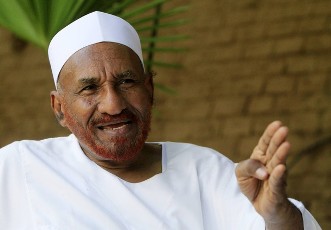Sudan’s NUP leader blasts government over Darfur crisis
March 13, 2014 (KHARTOUM) – The National Umma Party (NUP) leader a;-Sadiq al-Mahdi criticized the government’s policies in the western region of Darfur saying it has worked to tear the social fabric and transforming the conflict from a local traditional one to a national and international issue which led to a deteriorating situation despite the conclusion of bilateral agreements with some armed factions.

Al-Mahdi went on to say that the accords did not meet a series of legitimate demands that have received popular consensus among Darfuris including re-introducing representation in the presidency and the return of the 1956 borders, land system as it was before 1989, paying out individual and collective compensation for the victims, transitional justice and the allocation of wealth and power according to the population size.
The former Prime Minister said that one of the armed factions in eastern Darfur entered into the middle of a conflict between the Zaghawa and Alberti tribes adding that the situation in North Darfur on the other hand has turned into an all out war on a tribal basis.
He warned that the “Darfur fire” will continue and that the current bilateral talks approach by the government to resolve the crisis is not successful which could lead to intervention by the United Nations Security Council (UNSC) to issue another resolution under Chapter VII of the UN Charter.
On the death of the Darfuri student at the University of Khartoum (Uof K) this week, al-Mahdi supported the constitutional right of students and other citizens in peaceful expression. He condemned the violence and repression and the use of live ammunition which he blamed on authorities.
The opposition leader called for the formation of a commission of inquiry to assure accountability for the perpetrators. He also stressed that a law must be passed making university management independent from the ruling party which will allow the exercise of intellectual, political and student activity and cleanse the universities of violence tools.
Ali Abakr Moussa Idris, a third-year economics student at Uof K died in hospital of gunshot wounds sustained during a demonstration on Tuesday.
The protest was organized by students from Darfur following a public rally denouncing the deteriorating security situation in the region.
Amnesty International condemned the “use of excessive and unlawful force” against protesters.
The U.S. Embassy in Khartoum issued a statement today expressing its “deep regret” over the death and injuries at the university demonstration.
“The cornerstone of a democracy is the ability for citizens to exercise their right to peacefully assemble and express their views without fear of retribution. We urge the Government of Sudan to protect those basic human rights, and reiterate our support for the freedoms of expression and assembly. We look forward to the results of any further investigation into the incident” the press release read.
In a related issue, the NUP chief in North Darfur Mohammed Adam Abdul-Karim claimed that the recent fighting between government and rebels killed 29 people in al-Tiwaisha, 2 in al-li’ait Jar Al-Nabi, 19 in Saraf Omra, injured 60 others and displaced of 350,000 people adding that the chaos in Saraf Omra was carried out by the government.
A meeting was held on Tuesday to discuss the deteriorating security situation in the state which was attended by Sudan’s 2nd Vice President Hassabo Abdel-Rahman, minister of interior Abdel-Wahid Youssef, defense minister Abdel-Rahim Mohamed Hussein, governor of North Darfur state Youssef Kibir, and the director of the National Intelligence and Security Services (NISS) Mohamed Atta Abbas al-Moula.
Sources told Sudan Tribune that the quintet meeting approved crushing of rebel Sudan Liberation Movement/ Minni Minnawi (SLM-MM) militarily within 72 hours and restoring the four localities of Haskanita, Al-li’ait Jar Al-Nabi, Al-Tiwaisha, and Kalmando which fell at the hands of the SLM-MM over a week ago.
The same sources disclosed that the meeting decided to provide instant humanitarian assistance to the western area of North Darfur state where clashes recently took place between the government forces and militias loyal to the tribal leader, Musa Hilal.
(ST)
